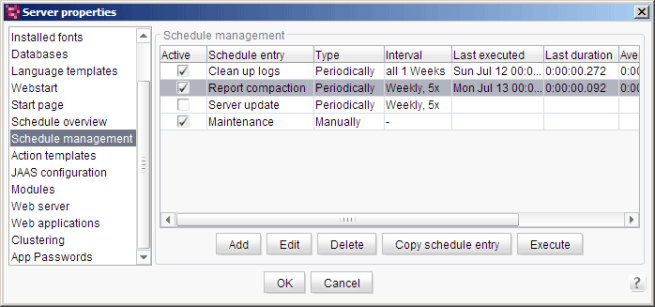Automatic reporting of software errors (optional)
FirstSpirit supports the automatic recording and management of errors. The user can thus play a major role in enabling errors to be detected and resolved, thereby helping to improve the quality of the software. Possible duplicate error reports can also be identified in advance and thus avoided.
The error reports can be sent to Crownpeak automatically via a web interface. As well as client error reports, they also contain server errors (e.g., errors during generation) and monitoring key data (e.g., GC-Time and Heap). Access data and an Internet connection are required. A corresponding schedule must also be configured (“Report analysis, compaction, and transmission” action, see Server-based actions).
Automatic reporting is deactivated by default. If it is activated, the following information is included in the data that is sent to Crownpeak:
- Software status: FirstSpirit version, installed modules, license
- System environment: operating system, Java version, etc.
Whilst every effort is made not to send project-specific content, this cannot be guaranteed.
 |
Users are not entitled to troubleshooting support for errors that are detected! For troubleshooting support provided in the context of software maintenance, all errors must be reported via the specified method. |
Configuration
Error reporting is deactivated by default. It is configured with the fs-server.conf file:
reporting.disabled:
The function is activated (false) and deactivated (true) with this parameter. If the parameter is not set, the function is deactivated by default (see Area: Server Reporting Parameters).
To activate error reporting, the
reporting.disabled=false
parameter in the fs-server.conf file must be edited accordingly.
The otherwise optional parameter
SYMBOLIC_HOSTNAME=
(see Area: Communication) should be used to enable better assignment of error reports. Therefore, this parameter should be used to assign a meaningful name for the FirstSpirit Server, for example
SYMBOLIC_HOSTNAME=Company 1, server A
SYMBOLIC_HOSTNAME=Company 1, server B
In addition, the FirstSpirit Server HOST: update.e-spirit.com must be accessible on PORT: 443 (HTTPs).
The sending of error reports can be controlled with a schedule which runs regularly at a defined point in time.
A “Report compaction” schedule is used for this purpose in the FirstSpirit ServerManager.
The schedule is available by default. If required, the time of the first execution and the interval can be adapted to meet individual requirements (Working with schedule management, see Schedule entry planning).
For regular execution of the schedule, the checkbox in the “Active” column of the schedule overview must be set. Alternatively, the schedule can be started immediately via the Execute button, triggering the sending of error reports several times a day.
However, regardless of the settings in the “Active” column, error reports are only sent to Crownpeak if the reporting.disabled=false parameter has been set in the fs-server.conf file.
If the “Report compaction” schedule is active, all error reports are collected in the /log/report server directory. Even if these reports are not sent to Crownpeak, they can be viewed by the server administrator. The reports are assigned the file ending .fsr (FirstSpirit report). (To view the files, create a copy and save it with the file ending .zip.)


